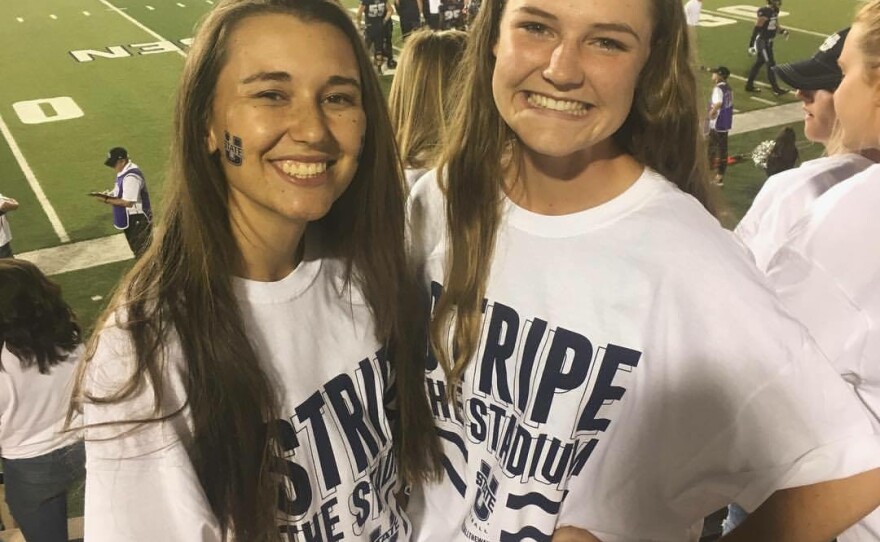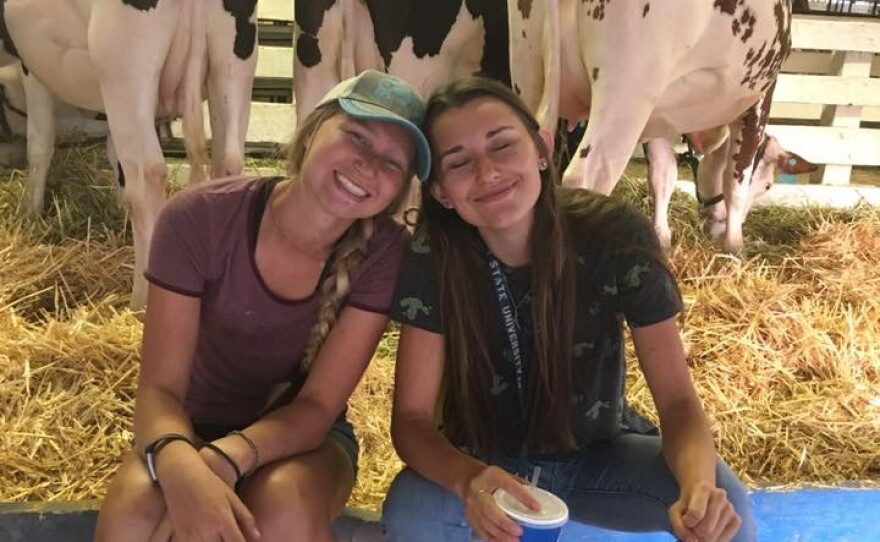During this next episode in our year-long series Crossing Borders, two university students who crossed state lines before arrived in Utah to discover their differences actually strengthen their friendship.
Meal time for Katlyn Uhart and roommate Emma Lane consists of beef fajitas. For these two Utah State University Agriculture students, food has played a major role in bringing two girls from very different backgrounds, together.
“We had landscape architecture together our spring semester,” said Emma Lane. “That is where friendship blossomed, I would say. We ate bagels every day in class, and that’s how we bonded. Bagels and landscape architecture.”
These bagel and bonding sessions evolved into a friendship that eventually led to the two becoming roommates.
Despite having very different life experiences with Lane growing up in the drier, desert region of California, about an hour and a half east of Bakersfield and Uhart spending her younger years homeschooled on a cattle ranch in the deserts of Northern Nevada, they have bridged the gap.
“I think one thing that sets us apart demographically, we really are on totally different ends in a lot of ways,” Katlyn Uhart said. “Emma comes from a pretty small family, she only has one sister and I’m the oldest of five. My parents have been divorced and hers have been together forever. Just a lot of differences like that, but I honestly feel like they’ve made us better friends because we have so much to talk about and compare notes on.”
Yes, bagels have played an important part in this friendship, but after spending time with the two of them, I have discovered that the bond that really ties these two together is their interest in cows, they have found a common community through agriculture.
“My background is actually not really in agriculture,” Lane said. “I grew up in an outdoor recreation family. I grew up whitewater rafting, camping, spending a lot of time outdoors.”
Unlike her friend, who was trotting around the ranch from day one, Lane didn’t discover her love for agriculture until she was in junior high school, when in seventh grade she was introduced to the 4-H and Future Farmers of America programs. At first she cared for rabbits, chickens, and goats, but eventually moved to caring for dairy cattle.
“Our sturdy RAV 4, that car got everything from goats to turkeys, and then on the weekends rafts,” Lane said. “Not the dairy cows, but all the dairy cows’ feed. You can imagine the amount of feed that was in my mom’s car. I kept my dairy cattle at my high school farm.”
While Lane was traveling back and forth to feed and water her dairy cattle on land owned by her school, after completing her course studies at home Uhart’s simply stepped outside to care for her beef cattle.
“One of my favorite things to talk about is comparing notes on the differences and the similarities and talking about which breeds are the best and it’s one of my favorite topics,” Uhart said. “I would say that agriculture influenced the person I am today. I look at a lot of situations differently when it comes to school, when it comes to economics, when it comes to my friends. Just because I was raised with a very different mindset.”
It was their shared passion for responsible and reasonable land use that led them both to become interested in studying agricultural communications. How they address sometimes controversial and layered political, social, and personal topics can lead to heated debates. Uhart admits that her more conservative upbringing sometimes clashes with Lane’s more liberal stance on issues like gun control.
“We talk through everything and we like to get each other’s perspectives on any issue that happens,” Uhart said. “Whether it’s nationally, locally or something that affects us at home. I think we do a really great job at talking about it and we discuss what we agree with, what we disagree with. Even our parents don’t agree with the fact that we talk about it. We’ll come home with different perspectives and they don’t necessarily agree but that’s my friend and that’s what she believes.”
“Anytime something come up in the news, like Katlyn said, we talk about it,” Lane said. “Sometimes I’ll be upfront with her and be like, ‘I don’t agree with what you’re saying, but I hear where you’re coming from.’”
Could it be that these two cow girls, one from California and the other from Nevada; who have crossed different state, political, and social boundaries have found a compromise in a campus community that encourages acceptance, diversity and creative problem solving?
“I would say don’t let a boundary get in the way of a great friendship,” Uhart said. “People are people, no matter what they believe, no matter where they come from. I don’t need to be best friends with someone that comes from the exact same place that I do. What I do need is a best friend that grew up on the river in the middle of California. It really doesn’t matter what somebody believes if they’re truly a good person and if you’re personalities match and I think Emma and I are a great example of that.”
“Because we’re so different is why we’re such good friends,” Lane said. “Another thing is just listening to what the other person has to say. Don’t get caught up in the fact that they have different beliefs than you. We vary on a lot of subjects but we talk about them and we acknowledge them but we also agree on so many other things, it’s sometimes scary how much on the same page we are.”
“The other day I was wanting ice cream really bad but I wasn’t going to say anything because we’ve also been trying to be good about not eating too much chocolate,” Uhart said. “I wasn’t going to say anything and Emma texted me about five minutes later and asked if I wanted any ice cream because she was at the store.”
The UPR Original Series "Crossing Borders" is a yearlong storytelling project between UPR and the USU Office of Global Engagement - providing services for international students and scholars; and facilitating study abroad opportunities for students and faculty. Details found here.









